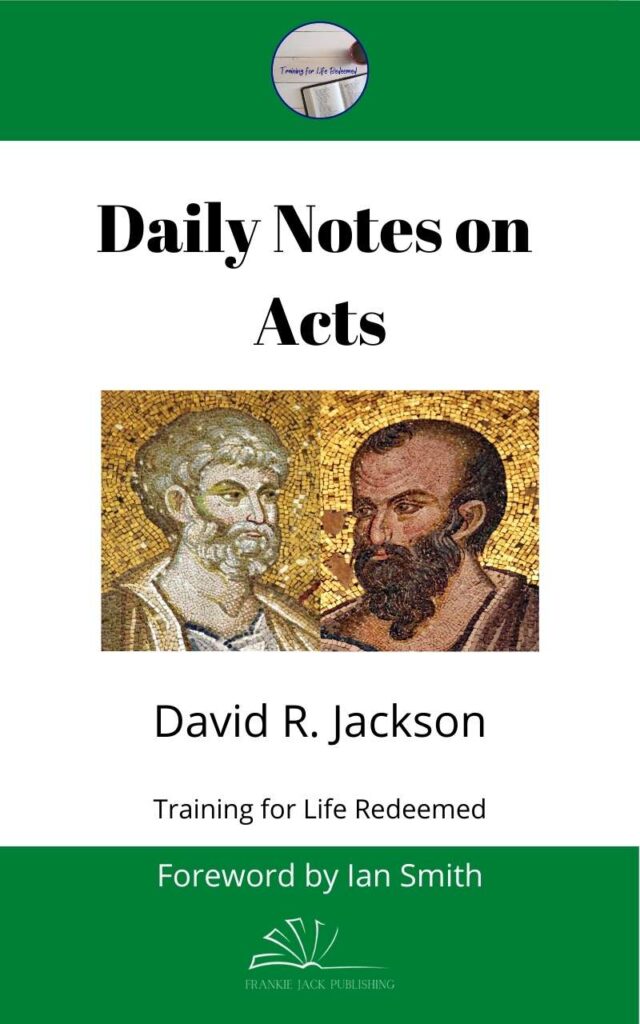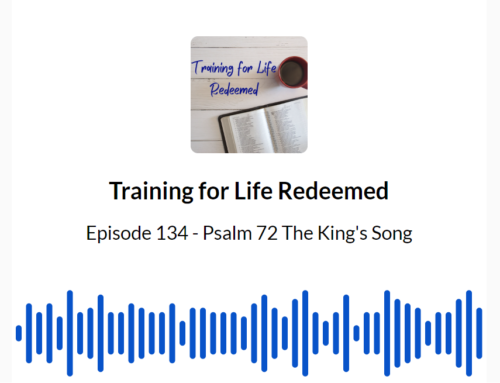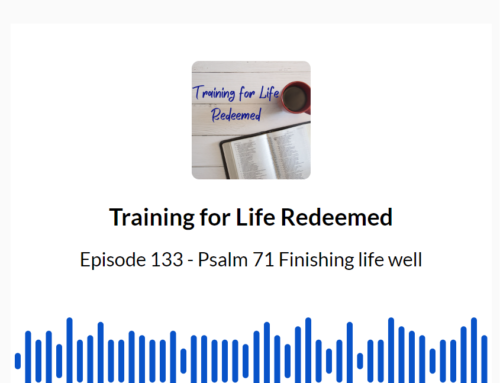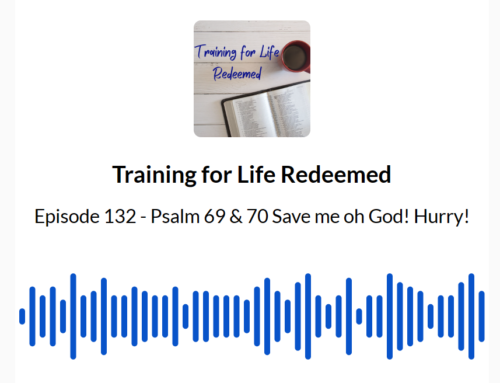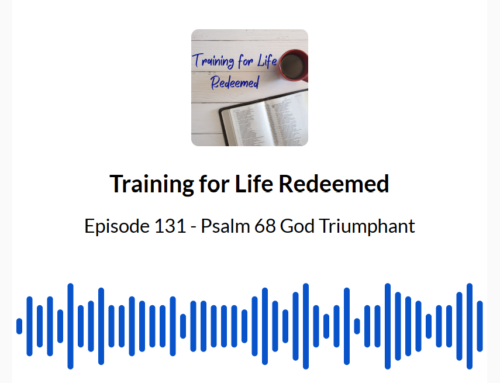We are beginning a new series of studies on the Book of Acts. They are designed for personal use or, even better, as preparation to meet with others and investigate God’s Word together. We are using “Flipped Learning.” Dan will explain the method. Today we look at how flipped learning works to get the most out of this series of studies.
Get the book: Daily notes on Acts
Take the challenge to work through the Book of Acts over thirty-five days. The notes will inform, and set you thinking. They are easy to read in under twenty minutes and include colour photographs, and a section for further reflection or discussion. Ideal for those who want to be prepared to read the Bible with first-time readers. At the end there is a section on words and their meaning, as well as who’s who in Acts.
Grab your notes for this episode by completing the form
and we will send you the link to all our notes.
Dan:
Hi, and welcome to episode 20 of tradingforliferedeemed. I'm your host, Dan. And I'm here with my dad, David Jackson. And in this episode, we're going to be introducing the new series of Bible studies that we're about to do, on the book of acts, we're coming into the new Testament. And basically these studies, w e're going to talk about how to use the podcast and the studies a bit in this episode, because we're going to explain a thing called "Flip learning" and hopefully help you to get the most out of what we're providing And so basically flip learning is when you take the kind of basics, the stuff you can do all your own individually, and you would do this as teachers we'll send that home for the students to do as homework, right? And they'll might watch a video. They might listen to a podcast, they might read a chunk of text. And then when they come into the classroom, the teacher is there to help them to answer their questions and to go deeper into the learning. And so the way that we're setting these up is that the reading of the Bible you can do on your own and the listening to these podcasts you can do on your own and so, if you do these two kinds of things as prep work, I guess before you then come into your Bible, study your growth group, or my church called them our gospel communities. As you come into that, you come prepared and ready to actually dive deeper into your learning and not just still be kind of skimming the surface with what's in the Bible. We want to get further than just the comprehension questions of, you know , who did Jesus say this too? And, you know, can you find a c ross-reference for this? We want to actually get you to go deeper. And I think dad, you talk about this idea of questions, queries, and quoibles. They might need some m ore definitions, I think,
David:Okay, this all comes out of that . You start with the whole concept of having a quiet time. So you start by, I need time to sit down and read my Bible. I need time to pray and I need to do that privately. And one of my observations about myself, I guess, particularly as a young man where my parents didn't talk about these things and my father probably would have opposed them is that my conversations with God was not something I wanted to share with anybody, besides which when I read the Bible, it's embarrassing. I mean, if the word of God is sharper than a two-edged sword piercing to the division of heart and life and everything else , [ Dan, Bone and Marrow] you really, this is more private than sex. I've said that to a few classes. My relationship with God is more intimate than my relationship with my wife. Now that means there's stuff here, you just, you don't want to do in public. And it's really where the action happens, where God's holy spirit takes the word of God and we start to do business. So we need that quiet space. I've said to a few people that , I reckon some of the most significant work that God , the holy spirit does happens at two o'clock in the morning when you're alone in the dark, where you're in bed and you just can't sleep and you're wrestling with stuff. So we want to start by having a time each day where we open our Bible and read it. I like to encourage people to bring a red pen and a ruler and underline the stuff that jumps out at you to annotate your Bible. There's a website that talks about trash your Bible. By the time you've read your Bible through once it's a mess and you've got to buy a new Bible,
Dan:I don't buy a new one. You can go with the same One. And you remember those old notes and that helps you to remember how it's already affected you and to see new things and mine are falling apart.
David:So the idea is I've got that time and people are short of time. So having a podcast, people don't bring Bibles to church anymore. They bring their phone and they listen to it in the car or something. So having that quiet time is where we start. And then if you're reading the Bible to get it finished, I mean, you look at the kids at school, here's a novel and they read it or a passage and they get it finished. And then you say to them, what did you read? And they got no clue. Cause the only reason they're reading it is to get you off their back or to tick a box on their reading chart or something. So we're going to read the Bible for all it's worth. And that means I'm going to sit there thinking about what I'm reading.
Dan:And you're essentially studying the Bible. It's not, you're not coming to it to just kind of it's not, it's not a novel, it's more, it's not even reading a textbook. It's more in depth than that. And i t hits you more personally. And so you really, you're studying the Bible in a way that impacts you in your life and in your decisions and in your knowledge of who you are and, your knowledge of who God is and what he's done and your understanding of who Jesus is and . It's a really, it is. It's how you come to God in your relationship. You're finding out more about who he is and you're interacting with him throughout that whole process. As you allow him to speak to you through the text and through the spirit, yo u k n ow, hitting your heart, but you're also going to be speaking to him in your prayers and it's, and that's, that's like your personal time. It's like when you go out with your wife or your husband and you sit down and you have your coffee, and it's just the two of you, and you're talking about your life plans and your dreams, your, you know, your six step plans or whatever you've got, but it's, it's so intimate because every time you come to the Bible, it's not the surface level stuff. Like you're not, you're not talking about what am I going to do? You know, my goal is to set up a new business or something. And it's actually that you're talking about who you are as a person and your character development. And the reality of real life, especially
David:And you're wrestling With all the spaghetti that's hitting the fan. during the week as well. You look at a marriage and you say, if I, if I don't sit down and have a cup of coffee or something with my wife and actually talk a few things through, pretty much after a while, you sort of have a conversation that goes, you know, what's happening today and you get a grunt , , are you upset? No , because you're supposed to have had that conversation and observed these things and figure, and our relationship with God can be like that where we just don't talk and we don't listen. And so we've got to have that, what we used to call a quiet time. But when I have a quiet time, I can't help, but come away from the Bible with a bunch of questions. There's always stuff that there's more to know. It's endless queries. Queries is where I read the Bible and the passage I'm reading. I'm thinking about some other passage and the two. I can't see how they go together. You know , if you want a classic example of that, when we get into Acts, check out how Judas died, you know, I can't put those two passages together. That's a query. Now, if I want to actually resolve the query, I'm going to have to go and do some research. Some queries you just got to live with. Yep . Quoibles are the real where the real action happens. Quoibles is where I quite frankly, I don't want the Bible to say that. Okay.
Dan:Which happens very Often, often the Bible was actually quite clear in what it says, but you want to make it. So it's not clear because its application is so bluntly plainly obvious, and you don't want to do it. That's
David:Right. So I mean, one of my failures to play in the classroom with this. Find the passages that, you know, year 11 are not going to want to be true. Okay. So one of the first ones is , there's a verse in Leviticus 19 says you're not supposed to have tattoos. So we do that one in class and absolutely everybody goes nuts. That's ridiculous. That's silly. That's weird. That's old Testament. You can throw it in the bin. That's a quoible. That's where I don't want the Bible to tell me that. And that's really where God starts to challenge my commitments that are more important to me than God. So quoibles are lots of fun. And when you go to a Bible study group, when the coils come up, the whole group starts thinking of reasons why we don't have to do that. And if you're a good Bible study leader, you sit and let them do that. And then you ask the really, really obvious question. Why are you trying to neutralize the text instead of dealing with God and what he's telling you?
Dan:Yeah. And I think doing this work, before you come to your Bible, study your growth group, your gospel community , by doing this work, it allows you when you come into your group. You can bring these questions and everyone's interested. And they're like, I had that question too. And what did you think? How did we come to that? And that other passage that was. That I thought was contradictory. Did you find an answer to that? And if you didn't, well, maybe we'll get together and have coffee this week and we'll have a look and see if we can find a solution together. It really stimulates the discussion that happens in your group to a much deeper level than your, your basic kind of Bible study that has your comprehension questions the whole way through. And we're now dealing with one, what people want to learn, which is normally a lot better than what other people climb up. Try and come up with for, yo u k n ow, your comprehension of what's in there. But you're also hitting people's, yo u k n ow, those quoibles that are hitting their heart. They're t he things you actually want to be addressing in your group.
David:Yeah. So when I look at again, we're coming off of school teaching background. So we've walked into a year, seven class at your hand and my Bible and you give them a worksheet. And when they go through the worksheet, there's a lot of comprehension questions and the comprehension questions. When you go around the classroom and you ask the comprehension questions, it's like a home Bible study group. Here's the text, there's your question. Who's going to answer it. Dead silence. Nobody wants to get the answer wrong in front of everybody. So your Bible study discussion group, you've got to be really pushing a rock up hill to get people to answer the questions on the discussion sheet. Year seven of course is no kid wants to be embarrassed in front of the whole class. So the hands don't go up except for Johnny who wants to dominate the whole classroom in the front row, who knows everything. And then you've got to manage him and you've got to manage their silence. So somewhere along the line, we flipped that. And we said, okay, I'm not going to for the, for the assessment task at the end of the semester, I'm not going to be asking you questions. I'm not going to be marking your answers. I'm going to be marking your questions. So you go home, read the text and send in your questions. I promise I'll answer them. That was a ridiculous promise. That cost me a hundred hours per class, per semester. And my teachers hated me because the kids just drowned us. It was, it was a flood. Like we tapped the dam. And that's when we realized that these people who won't talk are actually, we are the ones silencing them because we're examining them instead of us inviting them to come into the text and pour out their questions and get their questions answered. So we realized that somewhere along the line, a lot of the discussion that came out of the kids' questions, we could probably tell them that stuff before they came to the class. So we could get the comprehension stuff out of the way we could get the background knowledge stuff out of the way, and we could get straight to the queries and the quoibles. So then when, when we experimented with that, it was massive. Like I say, it was like, somebody just blew up Warragamba Dam and you say it again . I promised that I will clean up every pale of water. And boom.... It's a bit of a culture change that happens when you do this, but it's such a positive culture. I remember when I first started teaching the Bible in schools and I just started by us, like we had this set, you know , you have to teach this, this and this. And then at some point I went, you know what? We don't actually have a set curriculum per se at the school. Cause it was , , there wasn't one yet. And so I just said, what do you want to learn about? And they're like, can we learn about revelation? You're like, all right , let's do that. Like that we're only in year eight, but they were curious about it. They were interested in it. And it then meant that when we looked at it in class, they were engaged. Like they were like, this is cool. Like someone's actually showing us what we're interested in and where we're going.
Dan:And if you do that with any passage and you go, well , that was a bigger, larger curriculum thing. But if you let the kids read it or you feel that adults read it and then come into a group or come into a classroom where they got their questions and they know that that's, what's going to be looked at suddenly the engagement goes up massively . You don't have people showed up to your Bible study. sitting there going well, I'll just sit here and not answer any of the questions. And I'll might give you a prayer point at the end and then I'll leave you, you actually getting people coming who want to speak because they want to find out the answer to their questions that they want to find out and it works really well. But it is a culture change because you have to then really get people who, and it actually happens. Once they start reading their Bible, it's hard to stop.
David:And that's , that's the thing. There's two downsides to this. And the two objections that you get are people aren't going to do the homework at home. And my answer to that, my experience with that is that there are people who take probably two years, I think two years is the longest I've seen for people just to roll up to Bible study on a Friday night and they haven't done anything and half the rest of the group have. And so you've got half of the group that are really engaged in what's going on. And these guys roll up, they've done nothing. And they're looking at it going, ah , I dunno what's happening. And they're trying to play catch up in the middle of the group. I know that there's a women's Bible study program that has a rule. If you haven't done the homework, you're not allowed to talk in group, which is sort of motivating. But what I discovered was when they listened to the conversation, that's going on around them, they go home and say , what did I miss by not reading all that stuff? And they'll go home and read it. And after about the longest I've seen is two years, but the guy came , comes to the group, hasn't done his work and then he'll go home and he'll read this stuff. And then he hasn't done next week's group. But eventually he's going, hang on a minute. And all of a sudden, this is just too exciting to leave alone. The other downside to this. And you're going to hear every minister who runs Bible studies tell you this. But that means that the Bible study group leaders gotta be able to, the way I answer all the questions, they're going to know all this stuff. Whereas we're just facilitators. We were not here. We don't have all the answers and I have two answers to that. And one is up your game folks. You know, if you're going to lead a Bible study group , it's not just about how you manage people. You should have a grasp of content. You should take responsibility to study your Bible and to be an example, and you sh you should enjoy that. That's you should be full of stuff that you want to share with people. So in the, in the notes that we're providing, the idea is that if you read the notes before you come to Bible study group, not just the leader, but everybody, if you can get them involved, you've had your quiet time on your own, done your prayer, been praying. You've got your questions, queries and quoibles. If you read the notes, probably it can cross off a bunch of those questions. And then on the notes in the footnotes, you're going to see all sorts of passages where you can follow it up if you want to. But there's, there are a set of three or four questions for discussion and reflection, and we've designed those to hit your head, heart and hands. So it's what changes my thinking, what changes my behaviour, what changes my attitude as a result of this text. and by reading the notes, y ou come prepared for that discussion. And so we're trying to develop this f lipped learning culture where we spend n ow, this sounds a ll v ery involved, but here's a little clue. It takes on average three minutes to read the Bible passage for each of these studies. And on average it takes, u h, what did I say? Five less than 10 minutes, less than 10 minutes to read the notes. So when you go, oh, this is so much work. [Dan: It's 15 minutes.] Yeah. It's a podcast. And the train on the way t o work. It's three minutes to read your Bible, 10 minutes to read the notes and then all week to think about it. And two hours
Dan:To sit and have questions, ask questions, and have them answered
David:And conversations. You just, this will stimulate during the week.
Dan:Yeah . And then the other thing too, is that for those leaders, if they don't have the answers is that they should go and find someone who can help them. You know, you go to the ministers, go to the people at your church who have actually done multiple degrees in theology, o r g o o n harass the local Bible college or read books.
David:Well , what we used to do when I was pastoring was we'd pull them all in for a day or an afternoon before the term starts. And we would teach through the whole text and answer a lot of those questions before these people went out and tried to run a group. We did that for Sunday school teachers, all sorts of people. And quite frankly, doing this work, if you're going to teach a Sunday school class, if you're going to read the Bible with your kids, if you're going to, you know , have a youth group or whatever ministry you're involved in reading the Bible with your next door neighbour, who didn't know, the Bible was a book and there's increasing numbers of people for whom that's true. This is the kind of preparation that helps you do that. So that when they ask the questions, you're not embarrassed. You're not sitting there going "I dunno" and turning them off. You're , you're showing them that you're passionate and excited, and there are answers to these questions. So come on board, come and join us. This is fun.Yes , I
Dan: 20:39
Do join us as we go through our series on the book of acts, the series is in four parts. Each podcast we'll cover around three Bible studies and we are planning 12 podcasts in total on Acts. So please make sure that you subscribe, follow along to this. You can grab the PDF and stuff for the studies and everything. You know, you just head over to trainingforliferedeemed.com. And this is episode 20. So it's slash 20, and you can find some more information there. So trainingforliferedeemed.com /twenty , I hope that you will join us. And we'll look at acts one to start with .
